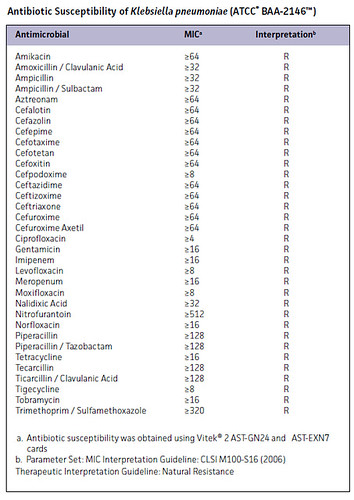If you haven't heard, there's a new antibiotic resistance gene, NDM-1, which stands for New Delhi metallo-beta-lactamase-1. This gene has been found in Gram-negative Enterobacteriaceae (E. coli and Klebsiella), and confers resistance to every penicillin derivative. Like the KPC genes, this gene is found on miniature chromosomes that also carry other resistance genes, making this organism resistant to just about everything we can throw at it.
By way of Maryn McKenna, we find this nice ATCC chart which shows just how bad one of these bacteria can be:

All those "R"s mean that drug doesn't work. Other than colistin, to which bacteria can rapidly evolve resistance, we really don't have anything else to treat this with.
Nothing.
And colistin is so old, we're flying by the seat of our pants in terms of appropriate dosage.
It would be nice if we had a national electronic antibiotic resistance surveillance system, so we could track these bugs. This would require additional public health funding. With five percent budget cuts in the best case scenario, I'm not sure where the money for that comes from though.
I am certain, however, that this problem can be solved with a tax cut to the wealthiest Americans. Or something.

"All those "R"s mean that drug doesn't work. Other than colistin, to which bacteria can rapidly evolve resistance, we really don't have anything else to treat this with."
Uhm. That's wrong. We have at least glycopeptides and several other non-beta-lactam antibiotics.
The authors of the paper reporting this isolate and subsequent isolates found it treatable only by polymixin and tigecycline. In the UK study, there were a few (single digits) still responding to aztreonam and cipro, but most were already resistant to those.
First report, AAC 2009: http://www.ncbi.nlm.nih.gov/pmc/articles/PMC2786356
Fuller report this fall, Lancet ID: http://www.thelancet.com/journals/laninf/article/PIIS1473-3099(10)70143…
Hmmm, it seems to me that humans are in population overshoot and we are due for a grand "correction" very soon. This is just one of many environmental factors converging to take us back to a manageable population...
To Alex:
Please back up your statements which are misleading and irresponsibly belittle what may become an extremely important problem.
Glycopeptides have no effect against Gram negatives such as these. The table lists just about every non-beta lactam available. We would all be delighted if you could point out one antimicrobial from any class that would be effective against these organisms.
What about the newer macrolides?
Roxithromycin ? Spiramycin? Telithromycin
?
"I am certain, however, that this problem can be solved with a tax cut to the wealthiest Americans. Or something."
'Cause who would want to sink the money into trying to get Big Pharma to finally expand the anti-infective pipeline? I mean, we've been saying that more work in that arena is needed longer than we've been saying that an Influenza pandemic was on the way. Guess we're just silly scientists, is all. (LOLsob)